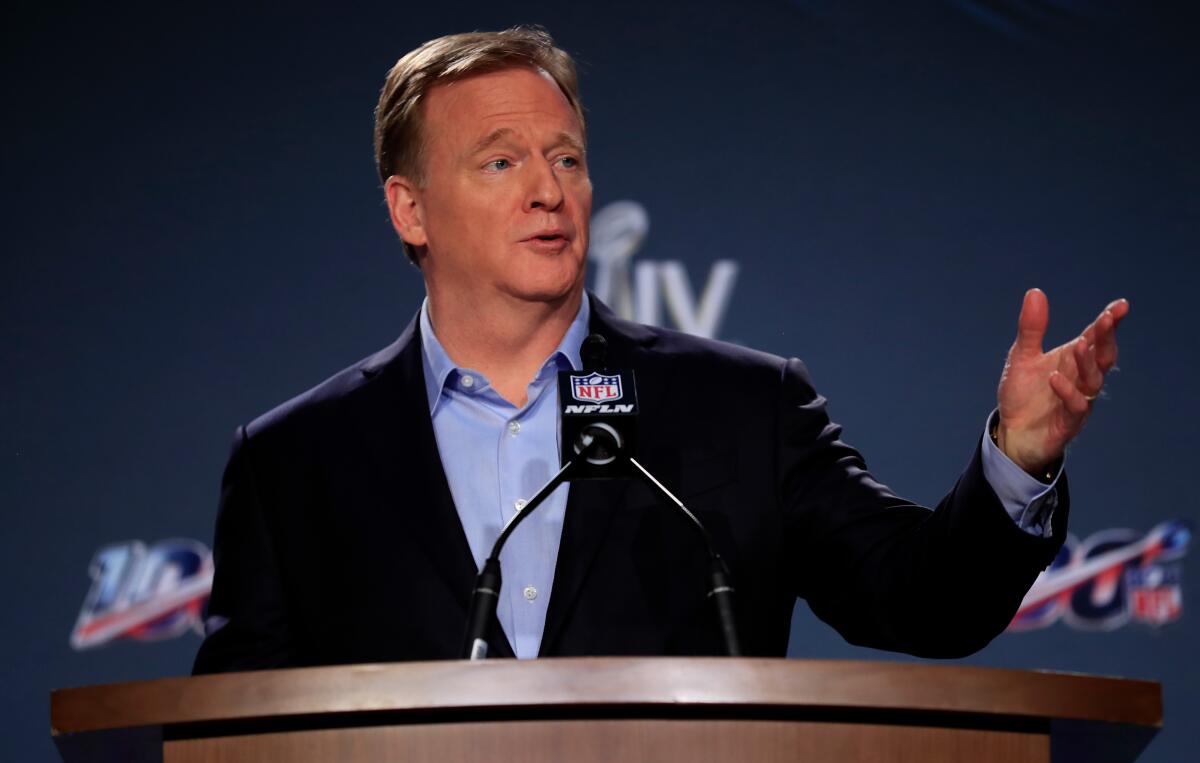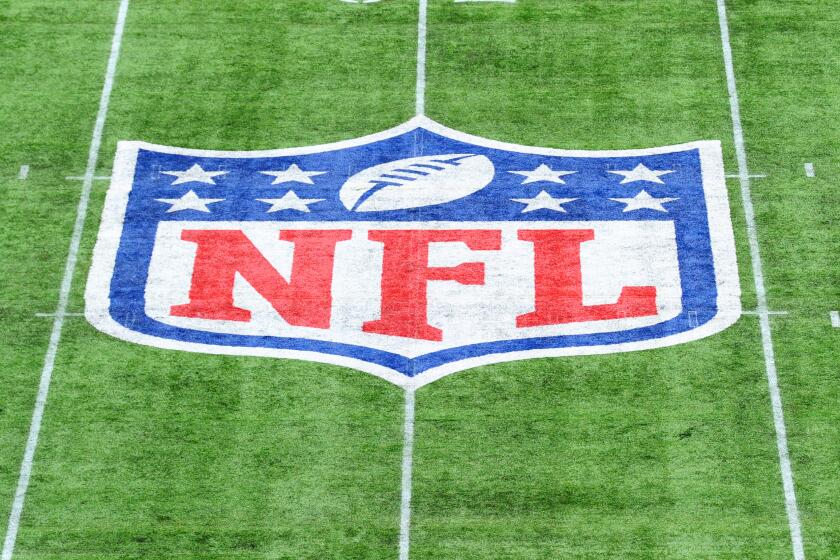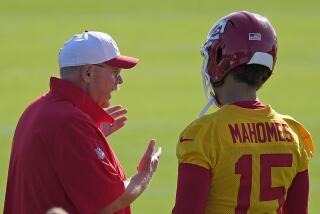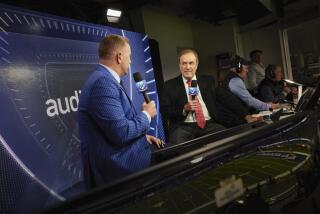NFL’s hurry-up strategy on a new contract aims to counter leverage by players

- Share via
INDIANAPOLIS — Not only is the NFL putting the draft and a team in Las Vegas this year, but its pending collective bargaining agreement with players has the hurried feel of a wedding at a drive-through chapel.
That’s not necessarily a bad thing. Maybe it will be wedded bliss. But considering it’s a 10-year deal with no way for either side to wriggle out, there’s bound to be some bumpiness over the next decade.
First of all, the deal isn’t done. In the coming weeks, it will be put to a full vote of the players and requires a simple majority to pass. Not everyone will bother to vote. Of those who do, a lot will be the under-the-radar players who are on minimum salaries or something close to that. They will be hard-pressed to give the agreement a thumbs down, because under its terms they stand to make at least $90,000 a year more. Considering the brevity of careers in this violent game, those players are going to feel compelled to rake in that money when they can.
The big concession in this contract, though, is the league adding a 17th game to the schedule. That’s no small consideration, although the owners are unwilling to budge on that. It’s going to happen, one way or another, and — to the applause of just about everyone — the preseason is going to be shortened.
But, with a significant number of players unhappy with the offer, does everything need to be resolved right now? Is it really do or die? Depends on whom you ask.
“There’s no Armageddon here,” said Andrew Brandt, executive director of the Jeffrey S. Moorad Center for the Study of Sports Law at Villanova University and a former Green Bay Packers vice president. “There’s no end of the world if this deal doesn’t happen.”
NFL player representatives vote to have owners’ CBA proposal go to full union membership.
Yet there is some urgency. We’re heading into a presidential election, and the reality-show aspect of that is going to be stiff competition for the NFL. TV numbers, riding high now, could well take a dip. The league would love to wrap up its new media deals as soon as possible, and those broadcast and online partners need to be assured there will be labor peace for the foreseeable future. Nobody wants to spend billions on bickering owners and players.
There’s another election looming. Eric Winston has to step down as president of the NFL Players Assn. next month because he’s no longer on an active roster. Vying for that position are Richard Sherman of the San Francisco 49ers and Russell Okung of the Chargers, and both are opposed to the current CBA proposal. As president, either could present even more of an impediment to the NFL.
“If one of those men is elected, that’s going to change the dynamic,” said Sheilla Dingus, president/editor for the nonprofit group Advocacy for Fairness in Sports. “I think the NFL is scared of that election. If I were a betting woman, I’d put money on it.”
So in that sense, the players have some rare leverage this time. Usually, it’s the owners who hold all the cards. That inspires the question: Did the players use enough of that leverage? After all, players have been saying for years they didn’t want to add a 17th game and all the health and safety risks that come with it. But here we are.
It’s not as if those players are getting bamboozled or shut out from the benefits of the extra work. Their share of the total revenue will climb from the current 47% to 48% and then 48.5%, but it doesn’t keep creeping up after that. In a league inching toward its goal of $25 billion in annual revenue, half a percentage point is a huge number. Still, this is not a situation where it will be a 50/50 split by the end of the CBA.
Who knows if the players could have struck a better deal? But this has the feel of walking into a car dealership and paying full sticker price for a styling ride, instead of grinding back and forth with a salesperson, and threatening to walk off the lot — even if it just means bargaining for free floor mats.
New England Patriots star Tom Brady is approaching free agency. John Elway, Bruce Arians and Brian Flores talk about what might be next for the Brady.
The economics are going to change with the new media deals, and the owners legitimately can say that the players can be part of that with the revenue split. But a long deal with no opt-outs is the recipe for resentment. The owners opted out of a deal in 2006 because the economic landscape changed. That allowed them to claw back a more favorable agreement, and anyone would want that freedom.
It’s hard to know what’s truly fair, and from the perspective of the fans, this is just millionaires arguing with billionaires, so it’s not bound to evoke a lot of sympathy. But labor harmony was a strength and hallmark of the NFL for years, and puts the focus on football itself.
“A lot of people are looking at this deal like, ‘Oh, man, they turned it down. There’s going to be a lockout,’” said Brandt, who writes for Sports Illustrated and hosts “The Business of Sports” podcast. “I’m saying, ‘Wait a minute, we’re 12½ months away from expiration, and we’re 21 months away from a potential game missed.’ Deadlines spur action, but we’re not near a deadline.”
This is a game of quick counts and hurry-up offenses. Everything hinges on speed. In this case, however, both sides might benefit from a breather.
More to Read
Go beyond the scoreboard
Get the latest on L.A.'s teams in the daily Sports Report newsletter.
You may occasionally receive promotional content from the Los Angeles Times.












